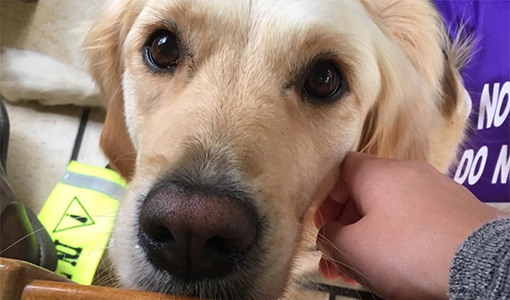When 21-year-old Jess brought home Golden Retriever puppy Luna the effect on her anxiety and depression was profound. ‘It was immediately noticeable how differently I felt around Luna. The first time I took her for a walk was terrifying as I’d barely left the house in three years — and definitely not on my own. But, Luna made me feel like I wasn’t really alone and we both began to learn that the outside world was a positive place to be,’ Jess says.
With Luna’s support Jess managed to begin at a university close to home. ‘Although I was back at university, I was diagnosed with several lifelong conditions that meant I was in chronic pain and constantly tired,’ Jess says. ‘So, we started training Luna as an assistance dog and I taught her little tasks to help me out, such as picking things up to prevent me getting dizzy and fetching help when I needed it.’

Spotting the signs
When Luna started showing intermittent pain in her left back leg, Jess took her to the vet immediately. ‘They referred Luna to a specialist who did x-rays and a physical examination and confirmed that she had torn her cruciate ligament,’ says Jess. ‘Luna went under for surgery and they found a 70% tear. Given her symptoms, she was being very brave.’
The operation went well, but Luna developed an infection afterwards which meant she was back in the emergency vets for a few nights and had a long course of antibiotics. Now she’s on the mend, Jess hopes she’ll be back to her old energetic self in no time. ‘Luna’s the perfect match for my poor health. She loves just lying in bed and getting lots of attention when I’m not well. She’s always there to help me out when I need it so we hope that once she’s better she will be able to continue her training and gain full assistance dog status.’
Luna to the rescue
With Luna’s help, both at home and on campus, Jess managed to graduate with a first-class honours degree and win the award for best overall degree mark across her whole course. ‘When Luna’s her usual healthy self, she can guide me to an exit when I get disorientated, provide counterbalance when I am not in my wheelchair (a task that prevents me falling over), help me get dressed and undressed, find and bring me objects, turn off lights and close doors and curtains during a migraine attack, and even place things on the checkout while we’re shopping,’ says Jess.
